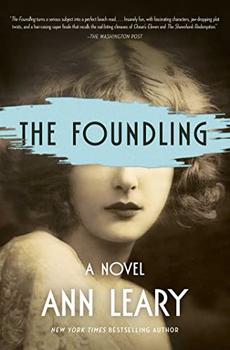Summary | Excerpt | Reading Guide | Reviews | Beyond the Book | Read-Alikes | Genres & Themes | Author Bio

A Novel
by Ann LearyThis article relates to The Foundling
.png) Dr. Agnes Vogel, The Foundling's complicated eugenicist arch-villain, has many real analogues in history. As the eugenics movement bloomed in the late 19th and early 20th centuries, women played an instrumental role in how its ideas took shape. In Britain, Sybil Neville-Rolfe (née Sybil Burney) was the founder of the Eugenics Education Society, a project that sought to harness theories of biological evolution for its own vision of societal advancement. Neville-Rolfe's legacy is a dubious one; she aimed to eradicate poverty and took stances to protect and support women, but her racist, classist and homophobic beliefs led her to advocate for policies that were cruel and discriminatory. Many of her views are directly echoed by Dr. Vogel in Leary's novel.
Dr. Agnes Vogel, The Foundling's complicated eugenicist arch-villain, has many real analogues in history. As the eugenics movement bloomed in the late 19th and early 20th centuries, women played an instrumental role in how its ideas took shape. In Britain, Sybil Neville-Rolfe (née Sybil Burney) was the founder of the Eugenics Education Society, a project that sought to harness theories of biological evolution for its own vision of societal advancement. Neville-Rolfe's legacy is a dubious one; she aimed to eradicate poverty and took stances to protect and support women, but her racist, classist and homophobic beliefs led her to advocate for policies that were cruel and discriminatory. Many of her views are directly echoed by Dr. Vogel in Leary's novel.
Neville-Rolfe was born in Greenwich, England on the 22nd of June in 1885, to a family of good standing. At 16, she became interested in prostitution as a social problem, inspired by the writings of novelist and journalist Annie S. Swan. Venereal disease was rife in urban centers at the time, and many commentators saw it as linked to female sex workers, unfairly blaming them while ignoring the culpability of their male clients. Spurred on by a desire to help these women, Sybil-Rolfe became focused on biology. Though she did not undergo a university education, she accessed texts by influential thinkers of the time, reading Charles Darwin and his cousin, the eugenicist Francis Galton (who would later become honorary president of the Eugenics Education Society). These writings influenced her burgeoning views related to how greater control over human procreation could be an instrument of social reform. Her belief in the benefit of eugenics was compounded by her experience working in a shelter for "fallen girls." There, she was shocked by the lack of knowledge about contraception and biology amongst the staff.
Determined to promote sexual hygienics and eugenicist ideals, Neville-Rolfe founded the Eugenics Education Society in 1907. Throughout her lifetime, she published numerous writings about the need for tighter controls over sexuality in England, with the aim of improving overall societal health. Believing that poverty and low intelligence were hereditary, she campaigned for social reforms that would discourage procreation amongst the working classes, who she deemed unfit to regulate their own sexual activities. Though some of her thinking had a progressive flavor, such as demands for greater access to contraception, and support for single mothers, her feminist leanings were distorted by an overriding belief in the superiority of wealthy and heteronormative couples. She considered homosexuality to be a kind of illness. In direct parallel with Dr. Vogel in The Foundling, she advocated for the forced segregation of the "feebleminded," who she saw as a threat to the overall health of the population. While she worked to reduce the stigmatization of unwed mothers, she also, like Dr. Vogel, saw them as lacking in personal agency, and as victims of the manipulations of men.
Though supposedly driven by a desire to improve the lives of women and enact social reform for the greater good, Sybil Neville-Rolfe ultimately comes out as a villain of history. According to the Oxford Dictionary of National Biography, her career exemplifies the "contradictions within turn-of-the-century feminism, for while she worked to alleviate the prejudices around illegitimacy, and to end prostitution and venereal disease, she was motivated by concern over national health and efficiency, and, ultimately, the future of the British race."
Portrait photo of Sybil Neville-Rolfe, 20th century, from the Wellcome Library Eugenics Society Archive (CC BY 4.0)
Filed under People, Eras & Events
![]() This "beyond the book article" relates to The Foundling. It originally ran in July 2022 and has been updated for the
April 2023 paperback edition.
Go to magazine.
This "beyond the book article" relates to The Foundling. It originally ran in July 2022 and has been updated for the
April 2023 paperback edition.
Go to magazine.




There is no such thing as a moral or immoral book. Books are either well written or badly written. That is all.
Click Here to find out who said this, as well as discovering other famous literary quotes!
Your guide toexceptional books
BookBrowse seeks out and recommends the best in contemporary fiction and nonfiction—books that not only engage and entertain but also deepen our understanding of ourselves and the world around us.